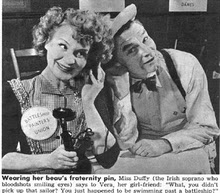Scroll to the bottom of the page for the shows.
This from the Internet Archive website:
“”Hullo, Duffy’s Tavern, where the elite meet to eat, Archie the manager speaking, Duffy ain’t here—oh, hullo, Duffy . . . ” It may have been the most familiar stock opening line in the history of old-time radio comedy.
The famous radio dive was one of those old-time radio birds that was at once a popular hit and a show onto which some of the biggest, or at least the most prestigious entertainers (including but not limited to Fred Allen and a few of his “Allen’s Alley” demimonde, Clifton Fadiman, Lucille Ball, Dinah Shore, Rudy Vallee, Monty Woolley, Oscar Levant, Robert Benchley, Peter Lorre, Ida Lupino, Artie Shaw, Arthur Treacher, Hedda Hopper, Boris Karloff, Jinx Falkenburg, James Garfield, and Adolph Menjou) clamoured to appear. “Duffy’s Tavern” enjoyed the rare position of being a major hit with listeners and critics alike.
Introduced as a “CBS Forecast” entry in the spring of 1941 (“Forecast” itself was a series designed to audition potential new CBS programs—it yielded two radio immortals, “Duffy’s Tavern” and “Suspense”), then done once again in the same series that summer, “Duffy’s Tavern” was the brainchild of Ed Gardner, a seasoned radio director and writer who got the idea after struggling to find a lead actor to handle a Lower East Side-like character in “This is New York” when he realised—doing a run-through to demonstrate what he had in mind—that he was the character . . . and, more important, the character informed the one that would make Gardner’s radio immortality.
Archie was a malapropping barkeep (“He’s got no talent of his own,” Archie might say of highbrow music critic Deems Taylor, “he just talks over the other guys in the Philharmonica”) who never met a get-rich-quick scheme he couldn’t ignore or a lovely lady he could seduce, all while assorted and sundry demimonde who might have made him resemble a sage often got the better of him, usually without trying. Though he tended to try to fight it off, almost invariably a certain affecting vulnerability would expose itself in the end, though never lapsing into mawkishness or cliche. Gardner’s Archie, in his way, was probably the most human comedy character to be born in the final powerful decade of old-time radio.
Gardner also pulled off the rare feat of forging an unheard character, Duffy himself, so completely that critics marveled at such a strong personality being established in spite of his weekly absence and listeners, as historian John Dunning cited “Tune In” saying, “can almost hear his voice when he calls in.”
Gardner and his original co-writer, eventual Broadway legend Abe Burrows, mounted the show with its impeccable cast—Eddie Green as Eddie, Charles Cantor as Finnegan, and Shirley Booth (then Gardner’s wife) as the original Miss Duffy, succeeded first by Florence Halop andeventually by Sandra Gould—for just over a decade. They did it live in New York until 1949 (Gardner habitually performed in a squashed porkpie hat and barkeep’s apron behind a makeshift bar; the apron eventually became famous for all the guest star autographs he collected on the garment), when Gardner moved production to Puerto Rico—at that time, the continental U.S. remained under the heavy tax structures in place since World War II, and Puerto Rico offered generous tax relief to enterprises relocating there.
The show is the obvious forebear of such tavern-based television hits as Jackie Glearon’s once-famous “Joe the Bartender” routines (Frank Fontaine’s Crazy Guggenheim character was an obvious remake of “Duffy’s” logic-and-learning challeged Finnegan, and the unseen “Mr. Dunahy” to whom Joe spoke to open the routines was an obvious nod to the always-unheard Duffy), “Archie Bunker’s Place” and “Cheers,” the latter of which has a family tie to the original—“Cheers” co-creator James Burrows is the son of “Duffy’s” original co-head writer Abe Burrows. Other writers on the show included Larry Marks, Lew Meltzer, Dick Martin (eventually to make his mark on television’s “Laugh-In”), Manny Sachs, Bob Schiller, and future “M*A*S*H” co-mastermind Larry Gelbart.
Ed Gardner died in 1963. “Duffy’s Tavern” never has.”
Listen Now! Click on any of the shows to start the audio and enjoy!!

